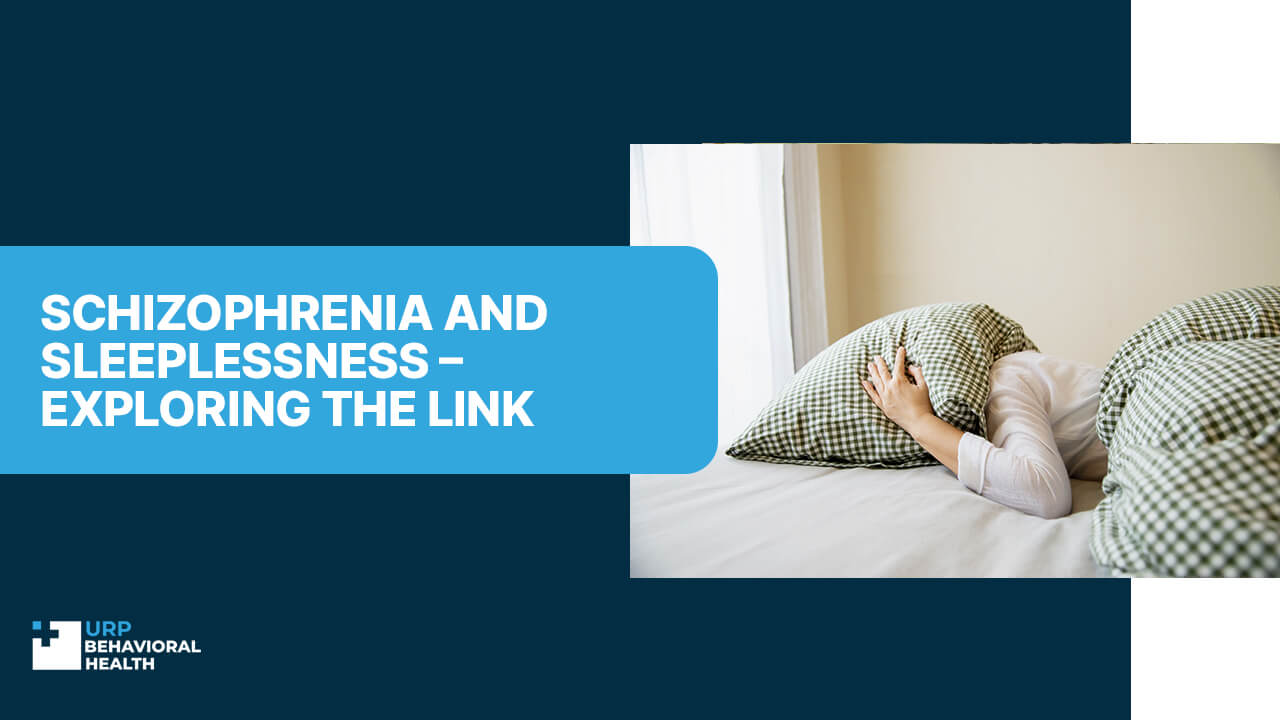
Schizophrenia and Sleeplessness – Exploring the Link
Schizophrenia is a complex chronic mental disease usually characterized by the following symptoms:
- Delusions
- Hallucinations
- Impaired functioning
- Disorganized thinking
However, except for those symptoms, patients with schizophrenia quite often also struggle with sleep disturbances. This includes alterations in sleep stages and circadian rhythms and can also provoke such dangerous signs as extreme fatigue and mood swings. Moreover, sleep problems lead to the worsening of schizophrenia symptoms and complicate treatment.
Why is this happening? Good sleep is a significant part of our life and health. Sleeping disturbances can impact not only our mental disorders but also our overall emotional condition and daily routine. That’s why it’s crucial for therapists who work with patients with schizophrenia to focus on healthy sleep in order to ease other symptoms of the disorder.
Recent research shows that sleep problems create a vicious cycle for those struggling with schizophrenia. It’s essential not only for professionals but also for regular people to educate themselves in the field of mental health in order to recognize the very first signs of the diseases such as sleep problems. No less important is to seek professional help to develop an efficient plan of treatment and achieve a quick recovery [1][2].
Don’t wait - confidential help is available right now for you or your loved one.
Can Sleep Deprivation Cause Schizophrenia?
As mentioned before, healthy sleep is an essential part of people’s lives. Though sleep problems alone don’t usually cause schizophrenia, they can trigger the disorder for those who are already predisposed to it. Why so? The thing is that sleep deprivation can affect brain function same as cognitive deficits that are common for those with schizophrenia. This includes impaired attention, memory, and executive function [1][2].
Some research has shown that prolonged sleep problems can even provoke hallucinations and paranoid thoughts in healthy individuals. For people who are already predisposed to schizophrenia disorder the situation can be even worse. Sleep problems such as insomnia and often awakings can also have a strong impact on the sleep-wake cycle [1].
What Sleep Problems Are Common in People with Schizophrenia?
Let us delve into what types of sleep disturbances are quite common among people suffering from schizophrenia. These are:
- Insomnia. A disorder primarily involves difficulty in initiating or maintaining sleep, waking up too early, and being unable to return to sleep. These in turn would often result in one experiencing severe tiredness as well as mood irritability for a significant duration [1].
- Sleep Apnoea. Sleep Apnoea is a condition that results in regular breaks in respiration during sleep. It is also quite common in schizophrenia patients and exacerbates the other symptoms [2].
- RLS (stands for Restless Leg Syndrome). RLS is an unpleasant condition in which people are forced to feel an intense desire to move their legs, leading to sleep interruptions and a rise in anxiety [1].
Additionally, the disorder schizophrenia also changes the architecture of sleep by decreasing the amount of time spent in a slow wave state while at the same time, interfering with REM sleep. This would in the long run impact the consolidation of memory as well as the ability to regulate emotion, thus making the management of other disorder symptoms even tougher [1][2]. Correcting these disturbances is also of utmost importance as they can severely affect a patient’s life and everyday activities. These problems are quite common among schizophrenia patients and making an accurate tailored approach to dealing with them may significantly lessen the seriousness of the disorder itself.
What Are the Risks of Disturbed Sleep with Schizophrenia?
What are the dangers of poor sleep in individuals with schizophrenia? These are the risks:
- The worsening of the symptoms. As noted earlier, sleep deficits can be quite strong in terms of being factors contributing to other symptoms of schizophrenia causing them to increase, and even instigating paranoia, hallucinations, and delusions. This may necessitate hospitalizations and lots of medical procedures [1].
- An increased possibility of dependence on substances. Patients with schizophrenia with insomniac tendencies may also wish to use drugs or alcohol in order to assist them while attempting to sleep. What’s worse, alcohol and drug consumption is never a solution as it always leads to the worsening of the condition [2].
- Physical health problems. Different sleep types’ disturbances like sleep apnea can trigger chronic diseases like cardiovascular disease, hypertension, and low immunity status [2].
- Financial problems. The increasing degree of schizophrenia may lead to recurrent and even more severe episodes which may in turn create a vicious cycle of dependence to seek help and at a hefty financial cost to the personally affected, their families, and the overall healthcare system [2].
Reach out today and let us create a treatment plan designed around your needs.
Treating Sleep Disorders That Occur With Schizophrenia
Now let’s explore a few curing approaches for sleeping disorders in patients with schizophrenia. These are:
- Medications
- Non-pharmaceutical therapy
- Lifestyle changes
Among patients suffering from schizophrenia, sleep problems are best treated with medication. This can be:
- Some antipsychotic medicines have sedative properties and are effective in treating sleep problems. However, this treatment can sometimes induce sleep problems as well. That’s why it’s crucial to first get a prescription from the doctor. [1].
- Benzodiazepines and non-benzodiazepine hypnotics. The medications are effective in treating insomnia and can be used for short periods.
- Constant Positive Airway Pressure therapy for sleep apnea. This helps to keep the airway open during sleep [2].
Non-pharmacological treatment includes one of the techniques known as cognitive-behavioral therapy. CBT-I is highly recommended as the most efficient treatment for sleep disorders in patients with schizophrenia. This therapy helps in establishing proper sleep patterns and decreases anxiety.
Change of lifestyle is once again fundamental and equally essential as the pharmacological and non-pharmacological treatment modalities. This includes:
- Exercising on a daily basis
- Daylight exposure
- Relaxation techniques
- Healthy diet
- Quitting bad habits
- Control of stress levels
Treatment strategies for individuals with both schizophrenia and sleep disorders require a comprehensive approach that should include psychiatrists, sleep specialists, psychologists, pharmacological and non-pharmacological approaches, and lifestyle modifications. A combination of these methods leads to better treatment outcomes for those who suffer [2].
How to Help Someone With Schizophrenia Sleep
Having acquainted yourself with what is exactly responsible for sleep disorders in people suffering from the schizophrenia illness, the time is upon us to lead the way on how to help a person like this. Such help needs to be made up of some combination of the following methods:
- Preparing an environment conducive to sleep. Such a method should involve dark, quiet, and a bedroom that is the right temperature. Use blackout curtains, white sound devices, comfy bedding, and pillows in order to improve sleep quality [2].
- Making a regular sleep schedule. Maintaining a healthy and constant sleep schedule is also essential to help the body develop a natural sleep-wake cycle and make it easier to fall asleep and wake up [2].
- Relaxation techniques. This approach contains deep breathing, muscle relaxation, and meditation. In addition to sleep disorders, it may help those struggling with schizophrenia to soothe their mind and body [1].
- Limiting of stimulants and screen time. Limiting caffeine, nicotine and screen time from electronic devices is the key to helping the body produce melatonin [2].
- Exercising. Exercise is very important for schizophrenia disorder and sleep problems, exercise helps to fight against anxiety and ensures proper sleep. However, exercises like walking, swimming, or yoga must not be performed right before bed, as it then has the reverse effect [1].
- Seeking professional support from therapists [1][2]. For people with schizophrenia disorder, it’s essential to visit therapists from time to time depending on the symptoms’ severity. Doctors will develop an efficient and individualized treatment plan including medications and non-pharmacological approaches to speed up recovery and improve overall quality of life [2].
Conclusion: Recap and Encouragement for Seeking Professional Support
Now we know why it’s so important to explore and understand the link between sleep problems and schizophrenia disorder. We also have learned that sleep disturbances are absolutely common for those struggling with schizophrenia and should be cured as they can lead to the worsening of other symptoms. These sleep problems usually include the following symptoms:
- Insomnia
- Sleep apnea
- Restless leg syndrome
This is the time when you should consult a professional if any individual is suffering from both sleep disorder and schizophrenia disease, the recovery chances would be very fast and the quality of living will be completely changed.
Professional help usually includes the following treatment methods:
- Pharmacological treatment
- Non-pharmacological treatment
- Lifestyle changes
- Multidisciplinary approach
Our team will verify your insurance and design a plan tailored to your needs.
In addition to that, there are some things that you can do by yourself, also to a person that you know. These are:
- Creating a sleep-friendly environment
- Making a sleep schedule
- Relaxation techniques
- Exercising
- Limiting stimulants and screen time
Combining professional help and lifestyle changes you can come to a quick recovery and improve your overall life quality.
Sources
- [1] “Genetic and environmental influences on schizophrenia”. https://pubmed.ncbi.nlm.nih.gov/8778683/
- [2] “Neurobiology and treatment of schizophrenia”. https://pubmed.ncbi.nlm.nih.gov/11122984/
- [3] “Social and environmental factors in schizophrenia”. https://pubmed.ncbi.nlm.nih.gov/27968732/
















